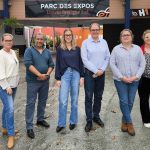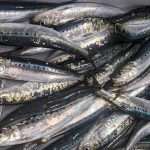The German North Sea saithe trawl fishery has successfully completed the assessment to the MSC’s environmental standard for well-managed and sustainable fisheries. The independent assessment team found the saithe stock to be on a healthy level, concluded low by-catch rates and limited impacts on the seabed and confirmed a sound management system. It is the first fishery in Germany to receive the MSC eco-label and the fishers have already reported increased interest in their catch thanks to the certification.
The fishery targets saithe in the waters around south Norway, the Faroe Islands and Iceland. Its eight vessels catch about 12,000 tonnes of saithe per year. Saithe is a schooling fish that doesn’t mix with other species. As a result, by-catch in the certified fishery is very low. The fishers use mesh sizes well above the legal requirement. Juvenile fish can escape through the gaps, continue to grow and spawn and thus help keep the stock abundant. The boats are equipped with so-called “Dynema” nets, which are about 16 times lighter than conventional nylon nets. The mouths of the nets are equipped with rock hopper wheels and footropes rather than heavy steel chains. The fishers tow their nets above stony ground, which has a low susceptibility to damage. The way the fishery is operated results in limited impacts on the seabed.
Kai-Arne Schmidt, Director of “Erzeugergemeinschaft der Hochsee – und Kutterfischer GmbH” in Germany’s Cuxhaven, comments: “The fishing industry needs to change dramatically. Disproportionate discard levels and stock preservation are issues that need urgent attention. However, we felt politics was not moving fast enough, so we decided to go for MSC certification. The MSC logo demonstrates to our customers that we take these issues into account and helps us distinguish ourselves from other fisheries.”
MSC’s Chief Executive, Rupert Howes, welcomes the certification: “With a population of well over 80 million and a high awareness of environmental issues, Germany is a key market for us. I am very pleased that saithe from this fishery can now carry our blue eco-label and that German consumers now have a certified sustainable choice from a domestic fishery. Saithe is one of the most popular species in Germany and I hear MSC-labelled products are already in development.”
In total, over 120 fisheries with annual catches of more than 5 million tonnes of seafood are engaged in the MSC programme. They represent 42 percent of the world’s wild salmon catch, 43 percent of the prime whitefish catch, and 18 percent of the lobster catches for human consumption. 35 fisheries are certified to the MSC standard and more than 1,700 seafood products carry the blue MSC eco-label in 38 countries.[








